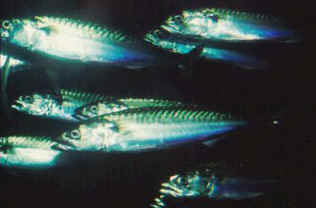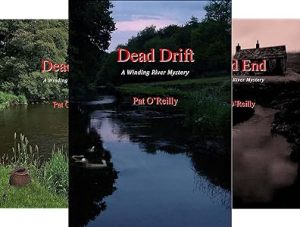Scomber scomber - Mackerel
Phylum: Chordata - Class: Actinopterygii - Order: Perciformes - Family: Scombridae

Order:
Family:
Although fast growing, mackerel have been known to live to a great age, with some specimens reaching 20 years of age. They are closely related to other sporting fish, including tunny and bonito, and for their size they are one of the hardest-fighting of all the sea fishes.
In the 1970s, hundreds of millions of mackerel per year were harvested commercially, and there are clear signs that this constituted serious over exploitation, because mackerel are nowhere near as abundant as they once were. Nevertheless, when you come across a shoal they are among the easiest of fish to catch, and so anglers need to exercise restraint and take only what they can reasonably justify... fresh mackerel are very good to eat.
The shoals of mackerel that appear off Welsh coasts in summer spawn in spring off western France and southern Ireland before migrating northwards up through the Irish Sea to their main feeding grounds off the Scandinavian coast.
Whether catching mackerel as bait for bigger fish or simply as a worthy quarry, light tackle adds to the sport. Spinner and fly are becoming increasingly popular when fishing from a small boat. Spinners are also a practical possibility from many rocky shore marks. Feather baits or worms are equally effective... once you have located a shoal. The telltale signs are the presence of large concentrations of sea birds feeding on fry driven to the surface by the mackerel (or feeding on the smaller mackerel themselves, of course).
Excited by rivers and streams? So are we, and we're pretty sure you would find the Winding River Mystery trilogy of action-packed thrillers gripping reading too. Dead Drift, Dead Cert, and Dead End are Pat O'Reilly's latest river-based novels, and now they are available in ebook format. Full details on our website here...
Buy each volume in ebook format for only £2.47 on Amazon... Paperbacks also available on Amazon at £6.95 each. All proceeds go towards keeping the First Nature website online.
Please Help Us: If you have found this information interesting and useful, please consider helping to keep First Nature online by making a small donation towards the web hosting and internet costs.
Any donations over and above the essential running costs will help support the conservation work of Plantlife, the Rivers Trust and charitable botanic gardens - as do author royalties and publisher proceeds from books by Pat and Sue.
